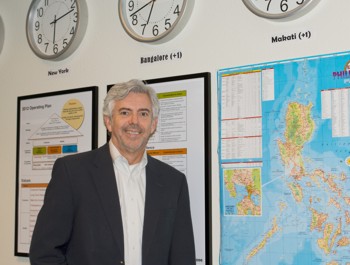Jeepnee Transports People From One Place in Life to the Next
Jeepnee Transports People From One Place in Life to the Next
Company Finds International Candidates to Fill Niche Positions Here
In these days of snappy corporate monikers, Hacienda newcomer Jeepnee stands out as both a memorable and meaningful name.
Jeepnee specializes in hard-to-fill positions, such as physical therapists, speech-language pathologists, and occupational therapists, recruiting qualified candidates from the Philippines and India. The island nation provided the inspiration for the company name, CEO John Dare explains. In the Philippines, jeepnee is the local term for the old American jeeps left over from World War II that have been modified to carry several passengers. The colorful vehicles now constitute a major means of public transportation. The name is thus an apt metaphor for the company's role in the labor market: "getting people from one place in their life to the next."
Dare is careful to point out that Jeepnee is not taking jobs from U.S. citizens. Rather, it focuses on jobs that are exceedingly difficult to fill. For example, according to the U.S. Bureau of Labor Statistics, the unemployment rate among physical therapists is one-twentieth of one percent. "If you want a job, you're working, and even if you don't want to work, you are probably working because the demand is so high," he observes.
Why is the supply-demand relationship so skewed? In many specialties, such as speech-language pathology and special education, "American universities are lagging the marketplace in their production of degreed professionals. They simply do not have the capacity to train enough candidates to meet rising demand." Chalk it up, at least in part, to the nation's aging population. Not only are Boomers retiring out of the professions, but they are increasingly on the receiving end of such services themselves.
The scarcity is exacerbated by the fact that qualified candidates gravitate toward the most desirable places to live, such as the Tri-Valley. Less attractive cities and rural areas of the country face even more hurdles in their recruiting. But the difference in surroundings is much less important to international candidates, still in search of the American dream. While the cost of living is obviously higher, they live very frugally and send much of their salary back home. Dare says that "in the Philippines, 10 percent of the population works abroad, remitting around $19 billion per year from around the world. That makes labor the country's largest export."
Jeepnee chose its geographic targets after extensive study. "We did a huge analysis across all countries and filtered across several criteria," Dare notes. India and the Philippines ranked first and second in the company's two overarching requirements: English proficiency and education. To ensure candidates have those competencies, the company has partnered with universities in those countries in the design of masters-level programs that meet U.S. standards in the desired fields.
Jeepnee's business model is to build a technology platform that will allow anyone to go online and take advantage of its services - a candidate, an employer, or a staffing organization. "We are trying to become the hub that enables employment in hard-to-fill positions. We are not competing with other recruiting organizations. The primary competency of Jeepnee is international recruiting. Today's companies have to expand their borders and look at the global workforce," Dare concludes.
For more information, visit www.jeepnee.com.
Photo: Jeepnee CEO John Dare brings an international perspective to recruiting.
Also in this issue...
- Interactive Case Management Model Produces Gains for Child Support Services
- Jeepnee Transports People From One Place in Life to the Next
- Business Bits
- Executive Profile: Mary Hanson, Frontier Wealth Strategies
- Homebuilder Taylor Morrison Has a 'Product for Everyone'
- It's Back-to-School Time at New World Music Academy
- Emergency Preparedness Resources Make Business Continuity an Achievable Goal
- Sustainable Agriculture Surrounds Sunol Valley Water Temple
- Good News Bears Spread Cheer and Comfort
- American Cancer Society's Discovery Shop is Favorite Holiday Destination
- Pleasanton Green Scene Fair
- Hacienda Index
- Calendar





